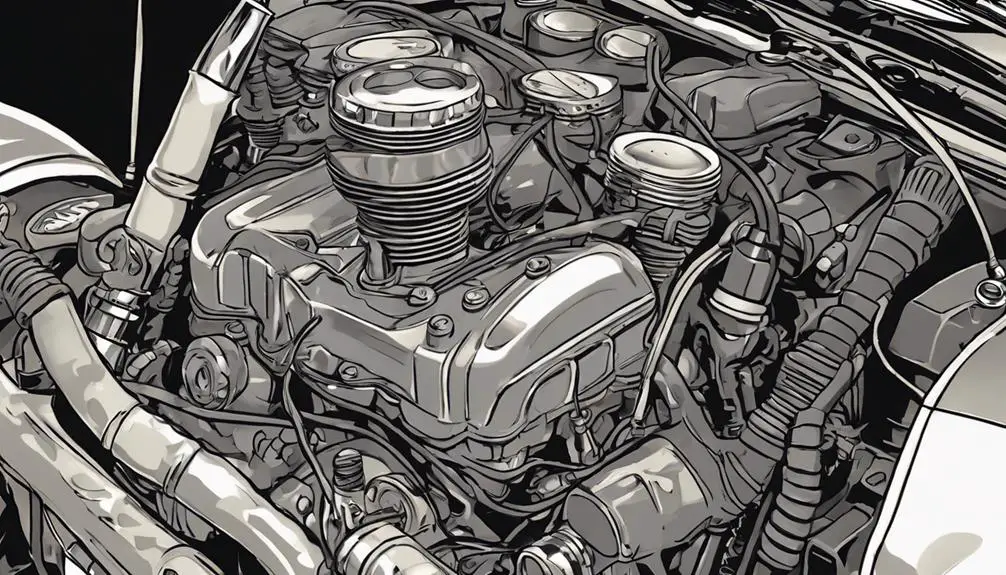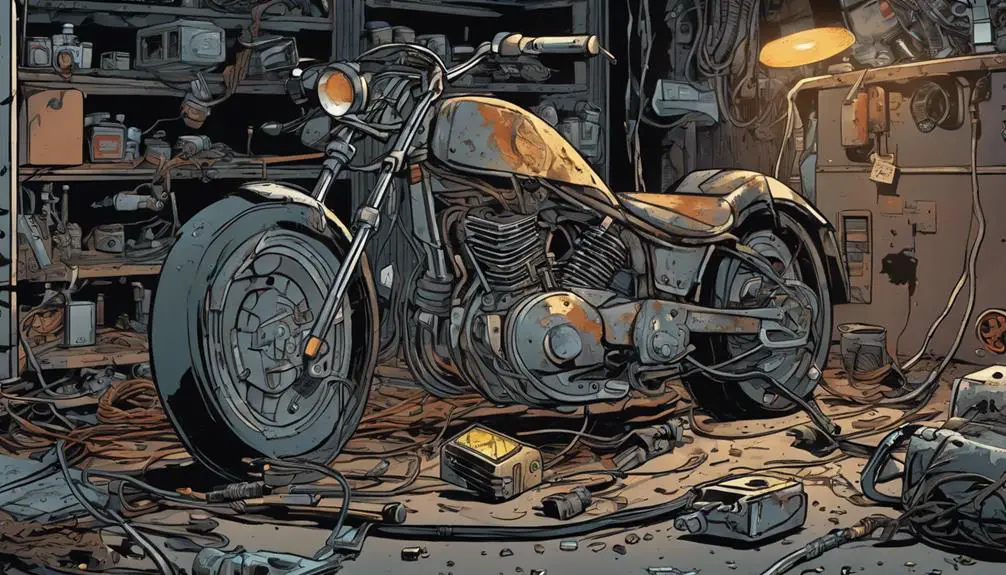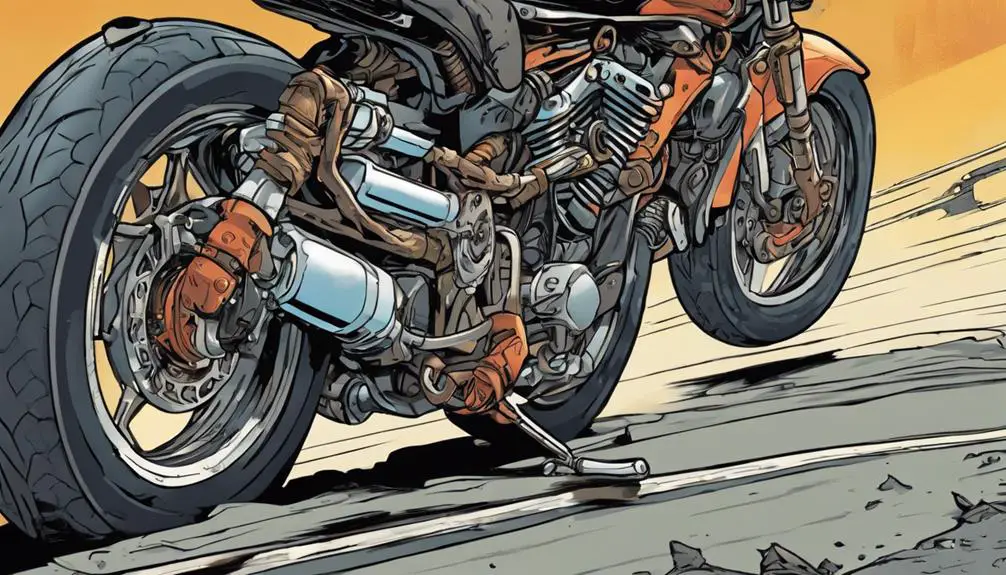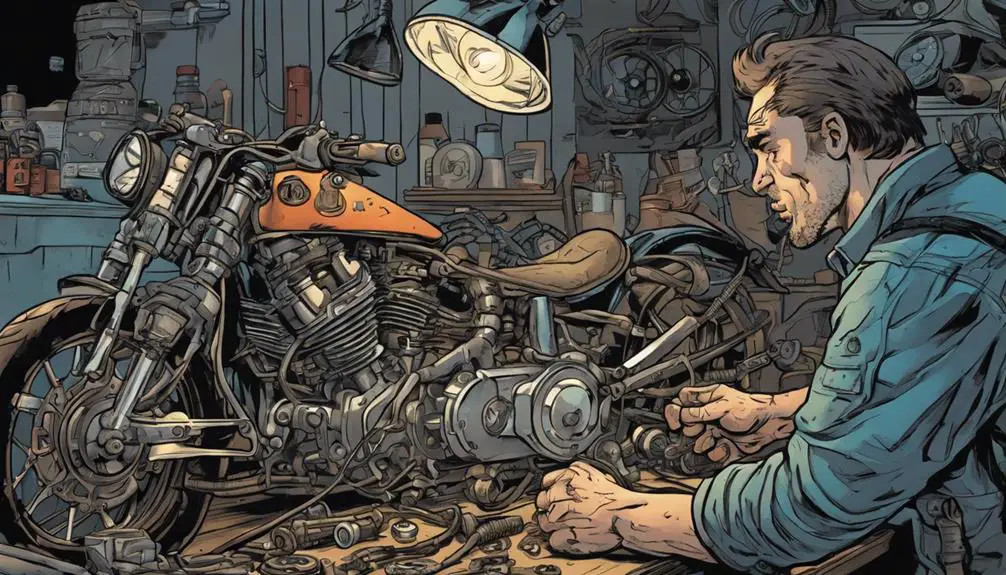You might not realize that even minor performance issues in your motorcycle can lead to significant safety risks. From engine misfires to faulty brakes, these problems often develop gradually, making them easy to overlook. Ignoring them could compromise your ride and even your safety on the road. So, what are the most common issues you should be aware of? Understanding these pitfalls can help you maintain your bike's performance and guarantee a smoother, safer ride.
Quick Takeaways
- Engine misfires can disrupt ride quality and result from faulty spark plugs or ignition coils, requiring regular maintenance to prevent safety risks.
- Fuel system problems, including clogged injectors and contaminated fuel, can affect performance and should be addressed promptly for smooth operation.
- Electrical issues such as weak batteries and wiring problems can lead to starting difficulties and inconsistent power, emphasizing the need for regular inspections.
- Brake performance issues, indicated by spongy brakes or grinding noises, necessitate immediate inspection to ensure rider safety and optimal braking efficiency.
Engine Misfires

Engine misfires can occur unexpectedly, leaving you frustrated and your motorcycle running rough. You might feel that familiar thrill of the open road turning into a jarring experience as your bike stutters and hesitates. It's not just a minor annoyance; it disrupts your ride and can pose safety risks.
Misfires usually stem from ignition issues, such as faulty spark plugs or bad ignition coils. As a rider, you crave seamless performance, and any hitch can steal that sense of freedom.
Take a moment to reflect on your bike's condition. Are you using the right spark plugs? Have you checked the ignition system? Even a small oversight can lead to significant issues. You shouldn't let engine misfires rob you of the exhilarating experience of hitting the road.
Tackle this problem head-on. Regular maintenance is your ally—cleaning or replacing spark plugs, and ensuring your ignition system is in top shape can make a world of difference.
Fuel System Problems
When it comes to your motorcycle's performance, fuel system problems can really hold you back.
Common issues that you might encounter include clogged fuel injectors, contaminated fuel, and a faulty fuel pump.
Addressing these problems promptly can help keep your ride smooth and efficient.
Clogged Fuel Injectors
Clogged fuel injectors can considerably hinder your motorcycle's performance by disrupting the fuel flow and leading to poor combustion. When your injectors are blocked, your bike struggles to get the right amount of fuel, which can cause rough idling, sluggish acceleration, and even stalling. You might notice a decrease in power, which can feel like a chain holding you back from the freedom of the open road.
Taking control of your ride means addressing these issues head-on. Regular maintenance is essential. You can prevent clogs by using high-quality fuel and adding a fuel system cleaner periodically. If you suspect your injectors are clogged, it's important to clean or replace them to restore that crucial flow.
Don't let clogged fuel injectors rob you of the exhilaration you crave while riding. By staying proactive with your motorcycle's fuel system, you guarantee a smooth, responsive ride that keeps you in tune with the road.
Embrace the liberation of a well-maintained bike, and take charge of your performance today!
Contaminated Fuel Supply
Poor fuel quality can lead to a contaminated fuel supply, creating significant problems for your motorcycle's performance and reliability. When you fill up with low-grade or tainted fuel, you're inviting issues like misfires, rough idling, and reduced power. Contaminants such as dirt, water, or even microbial growth can wreak havoc in your fuel system, causing your ride to feel sluggish and unresponsive.
You might notice a decrease in fuel efficiency or an increase in engine knocking, signaling that something's amiss. Don't underestimate the impact of contaminated fuel; it can damage your fuel system components over time, leading to costly repairs.
To free yourself from these issues, always opt for high-quality fuel from reputable sources. Regularly check your fuel filter and replace it as needed to keep your system clean. If you suspect contamination, consider draining your tank and cleaning the fuel lines.
Faulty Fuel Pump
A faulty fuel pump can seriously hinder your motorcycle's performance, preventing the engine from receiving the proper fuel flow it needs to operate efficiently. When your fuel pump starts to fail, you might notice stalling, rough idling, or a lack of power during acceleration. These symptoms can be frustrating, especially when you're chasing that exhilarating ride.
To diagnose a faulty fuel pump, start by listening for unusual sounds from the pump. If it's quieter than usual or makes a whining noise, it could be on its last legs. Additionally, check for fuel leaks or a decrease in fuel pressure, as these can be telltale signs of trouble.
Ignoring these issues can lead to more significant problems down the line, so don't hesitate to get it checked. A functioning fuel pump guarantees your bike roars to life, giving you the freedom to roam the roads with confidence.
Electrical System Failures

When your motorcycle's electrical system fails, it can lead to frustrating performance issues.
You might encounter battery problems, wiring issues, or charging system malfunctions that can leave you stranded.
Understanding these common electrical failures will help you troubleshoot and maintain your ride.
Battery Problems
Have you ever experienced a motorcycle that just won't start? It can be incredibly frustrating, especially when the open road is calling your name. One of the most common culprits behind this issue is a failing battery. Your bike's battery provides the power needed to crank the engine and run essential electrical components. If it's weak or dead, it'll leave you stranded, robbing you of your freedom.
To guarantee your battery stays healthy, check its voltage regularly. A fully charged motorcycle battery should read around 12.6 volts or more. If it dips below 12.4 volts, it might be time to recharge or even replace it. You should also inspect the terminals for corrosion and verify they're securely connected. Loose or dirty connections can prevent your bike from starting, no matter how strong the battery is.
Investing in a quality battery and maintaining it can make all the difference in your riding experience. After all, you don't want anything holding you back from the joy of the ride. So, take charge of your bike's battery health, and keep that spirit of liberation alive!
Wiring Issues
Battery problems often signal deeper issues in your motorcycle's electrical system, with wiring failures being a common source of frustration. If you notice flickering lights, inconsistent power, or unexpected shutdowns, it's time to explore your wiring. Loose connections, frayed wires, or corrosion can wreak havoc on your ride, leaving you stranded when you least expect it.
To liberate your bike from these pesky issues, start by inspecting the wiring harness. Look for any signs of wear and tear, especially around the battery terminals and connectors. A simple visual check can reveal problems that are easy to fix. If you spot any damaged wires, consider replacing them or using electrical tape as a temporary solution.
Don't underestimate the importance of maintaining clean connections. Dirt and grime can cause resistance, leading to power loss. Regularly clean your terminals and connectors to guarantee a smooth flow of electricity.
Charging System Malfunctions
Diagnosing charging system malfunctions is crucial for keeping your motorcycle running smoothly and avoiding unexpected breakdowns. When your bike struggles to start or the lights flicker, you might be dealing with a faulty battery, stator, or regulator/rectifier. Each of these components plays a critical role in ensuring your ride has the power it needs.
First, check the battery for corrosion or loose connections. A weak battery can drain your freedom, leaving you stranded.
Next, inspect the stator. It generates power, and if it's damaged, you won't have enough juice to keep your bike alive. Use a multimeter to test its output; if it's below specs, it's time for a replacement.
Don't forget the regulator/rectifier, which converts AC to DC and controls voltage. If it's malfunctioning, you could overcharge or undercharge your battery, leading to further issues.
Regular maintenance can help you catch these problems early, so you can stay on the road and enjoy the ride. Remember, freedom on two wheels is all about reliability—keep your charging system in check, and your motorcycle will thank you.
Brake Performance Issues
Brake performance issues can seriously affect your motorcycle's safety and handling, making it vital to address them promptly. If you notice that your brakes feel spongy or require excessive force to engage, it's time to investigate. This might signal air in the brake lines or worn-out brake pads, both of which can compromise your freedom on the open road.
Another common issue is brake fading, where your brakes lose effectiveness after prolonged use. This often happens during long descents or aggressive braking, leading to a dangerous situation. If your brake lever feels unusually soft or if you hear grinding noises, you should inspect your braking system immediately.
Don't forget about the importance of regular maintenance. Keeping an eye on your brake fluid level and changing it as needed can prevent corrosion and promote peak performance. Additionally, check for any leaks or damage to the brake lines.
Your ride is about liberation and control, so make sure your brakes are up to the task. Remember, staying proactive with your motorcycle's braking system not only enhances your performance but also keeps you safe, allowing you to enjoy the ride without worry.
Suspension and Handling Concerns

While maintaining your brakes is essential for safety, addressing suspension and handling concerns is equally important for a smooth and controlled ride. Your suspension system directly influences how your motorcycle responds to the road, affecting your comfort and confidence.
If you notice excessive bouncing, swaying, or a harsh ride, it's time to inspect your forks and shocks. Worn-out components can lead to unpredictable handling, making every twist and turn feel like a gamble.
Pay attention to sag settings as well; they determine how your bike sits under load. If your bike feels unstable or tips too easily, you may need to adjust the preload or damping. A well-tuned suspension not only enhances your experience but also allows you to release your spirit on the open road with confidence.
Don't overlook the importance of regular maintenance, either. Clean and lubricate your suspension components to prevent wear and tear. If you're unsure about your setup, consult a professional to get it dialed in.
Trust your instincts—an optimized suspension will help you enjoy the freedom of the ride, connecting you to the road and the thrill of the journey ahead.
Tire Wear and Traction
Tire wear directly impacts your motorcycle's traction and overall performance, making it essential to regularly inspect your tires for signs of damage or uneven wear. Ignoring this vital aspect can lead to compromised handling and unsafe riding experiences. When you feel the freedom of the open road, you don't want to be held back by worn tires.
Check for tread depth, as shallow grooves can reduce grip, especially in wet conditions. If your tires show uneven wear patterns, it could indicate alignment issues or improper inflation. These problems can rob you of that exhilarating connection with the road, leaving you feeling less in control.
Proper tire maintenance not only enhances your motorcycle's performance but also empowers you as a rider. When your tires grip the pavement, you can confidently navigate curves and accelerate smoothly.
Transmission Difficulties

Transmission difficulties can often arise unexpectedly, disrupting your ride and impacting overall performance. You might notice issues like slipping gears, unusual noises, or difficulty shifting. These problems can make you feel imprisoned on your own motorcycle, robbing you of that exhilarating freedom you crave.
First, check your clutch. A worn or improperly adjusted clutch can lead to frustrating shifts and can feel like a weight dragging you down. Make sure the lever's free play is set correctly. If you're still facing issues, inspect the transmission fluid. Low or dirty fluid can hinder performance, so topping it up or replacing it might just liberate your ride.
Don't overlook the chain and sprockets either. A poorly maintained chain can cause rough shifting and affect your overall experience. Regularly clean and lubricate the chain to keep it smooth and responsive.
Lastly, if you're still experiencing troubles, consult a mechanic. They can help identify underlying issues that might be holding you back. Remember, your motorcycle is your ticket to freedom—don't let transmission difficulties keep you from the open road!
Common Questions
How Can I Prevent Performance Issues in My Motorcycle?
To prevent performance issues in your motorcycle, you've gotta stay proactive.
Regularly check your oil levels, clean or replace air filters, and inspect tire pressure.
Don't forget to keep the chain lubricated and adjust brakes as needed.
A little maintenance goes a long way!
Also, take it for occasional rides to keep everything in sync.
By staying attentive and engaged, you'll guarantee your ride remains smooth and exhilarating.
Enjoy the freedom!
What Are Signs of an Impending Motorcycle Performance Problem?
So, you think your bike's invincible, huh?
Well, if you notice strange noises, sluggish acceleration, or weird vibrations, it's time to wake up!
You might also spot warning lights flickering like disco lights or smell something funny—no, not your buddy's lunch!
Trust your instincts; if something feels off, it probably is.
Keeping an eye on these signs can save you from a two-wheeled disaster.
Stay vigilant, and enjoy the ride!
Can Weather Affect Motorcycle Performance?
Absolutely, weather can impact your motorcycle's performance.
Rain can reduce traction, making it harder to control your ride, while extreme heat might cause overheating issues.
Cold temperatures can thicken your oil, affecting engine efficiency.
Wind can affect stability, especially at higher speeds.
So, it's essential to adjust your riding style based on the conditions.
Stay aware of the weather, and you'll enjoy a safer, more liberating ride every time you hit the road.
How Often Should I Perform Maintenance to Avoid Issues?
Think about your bike like a trusted companion; wouldn't you want to keep it in top shape?
You should perform maintenance every 3,000 to 5,000 miles, or at least twice a year.
Regular checks on fluids, tires, and brakes can save you from headaches down the road.
Are Aftermarket Parts Reliable for Improving Motorcycle Performance?
When considering aftermarket parts, you'll find that reliability can vary. Some parts enhance performance considerably, while others mightn't meet expectations.
It's essential to research brands and read reviews, ensuring you choose quality components. You'll often discover that reputable manufacturers stand behind their products, providing warranties.
Wrapping Up
In the world of motorcycles, performance issues can be like storm clouds threatening a sunny ride.
By staying vigilant and addressing problems such as engine misfires, fuel system glitches, and brake performance, you can guarantee your bike runs smoothly and safely.
Regular maintenance is your best defense against these common pitfalls.
So, keep your motorcycle in top shape, and you'll enjoy the thrill of the open road without a hitch.
Happy riding!